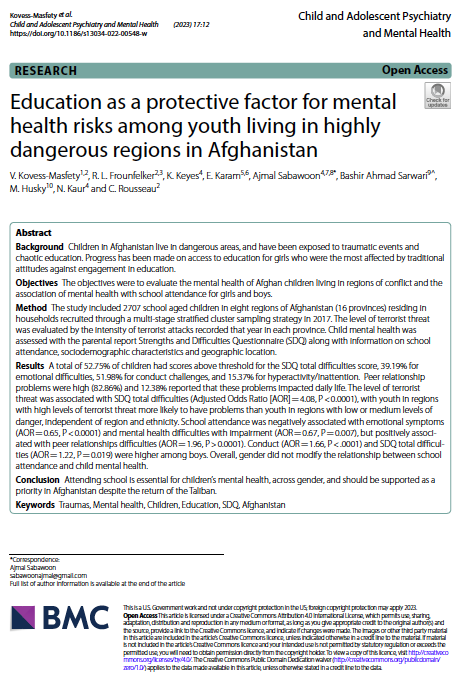Education as a protective factor for mental health risks among youth living in highly dangerous regions in Afghanistan
Background
Children in Afghanistan live in dangerous areas, and have been exposed to traumatic events and chaotic education. Progress has been made on access to education for girls who were the most affected by traditional attitudes against engagement in education.
Objectives
The objectives were to evaluate the mental health of Afghan children living in regions of conflict and the association of mental health with school attendance for girls and boys.
Method
The study included 2707 school aged children in eight regions of Afghanistan (16 provinces) residing in households recruited through a multi-stage stratified cluster sampling strategy in 2017. The level of terrorist threat was evaluated by the intensity of terrorist attacks recorded that year in each province. Child mental health was assessed with the parental report Strengths and Difficulties Questionnaire (SDQ) along with information on school attendance, sociodemographic characteristics and geographic location.
Results
A total of 52.75% of children had scores above threshold for the SDQ total difficulties score, 39.19% for emotional difficulties, 51.98% for conduct challenges, and 15.37% for hyperactivity/inattention. Peer relationship problems were high (82.86%) and 12.38% reported that these problems impacted daily life. The level of terrorist threat was associated with SDQ total difficulties (Adjusted Odds Ratio [AOR] = 4.08, P < 0.0001), with youth in regions with high levels of terrorist threat more likely to have problems than youth in regions with low or medium levels of danger, independent of region and ethnicity. School attendance was negatively associated with emotional symptoms (AOR = 0.65, P < 0.0001) and mental health difficulties with impairment (AOR = 0.67, P = 0.007), but positively associated with peer relationships difficulties (AOR = 1.96, P > 0.0001). Conduct (AOR = 1.66, P < .0001) and SDQ total difficulties (AOR = 1.22, P = 0.019) were higher among boys. Overall, gender did not modify the relationship between school attendance and child mental health.
Conclusion
Attending school is essential for children’s mental health, across gender, and should be supported as a priority in Afghanistan despite the return of the Taliban.
Members and SHERPA Teams

Cécile Rousseau
Professor, Division of Social and Transcultural Psychiatry, Université McGill

